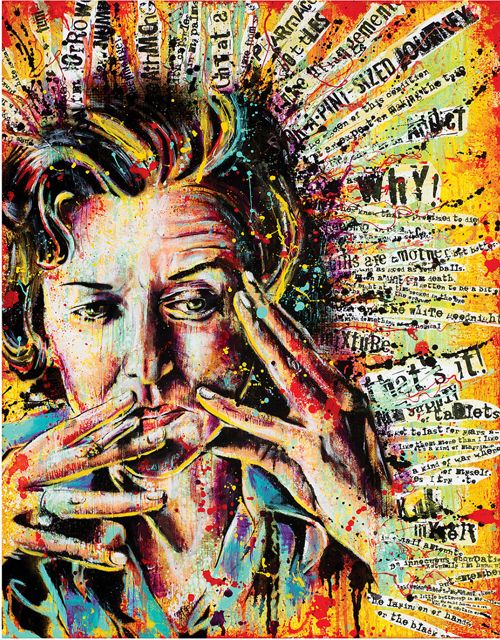A CORRESPONDENCE
(Anne Sexton's letters)
So bound up in herself
there's no room for poetry
or anyone else. Her letters
are emotional spirit levels
showing how askew she is,
all angled and off centre.
The sun's been hidden
all day, the cloud bearing
down like a blackout blind,
pushing into headache
and disinterest, lack
of attention. Your ideas
are confusing, but then
so are mine. How can we
converse across the distance?
I know the problem is myself,
that the answers are tangled
up in language and despair.

Anne Sexton - Queen of This Condition -- Sara Bowersock
(Anne Sexton's letters)
So bound up in herself
there's no room for poetry
or anyone else. Her letters
are emotional spirit levels
showing how askew she is,
all angled and off centre.
The sun's been hidden
all day, the cloud bearing
down like a blackout blind,
pushing into headache
and disinterest, lack
of attention. Your ideas
are confusing, but then
so are mine. How can we
converse across the distance?
I know the problem is myself,
that the answers are tangled
up in language and despair.

Anne Sexton - Queen of This Condition -- Sara Bowersock
Anne Sexton won the 1967 Pulitzer Prize for poetry for "Live or Die," a fictionalized memoir about her experiences with mental illness. In 1954, at 27, she experienced her 1st manic episode. After a recurrence in 1955, Martin Orne became her therapist and encouraged her to write poetry. Late in life a Catholic priest refused to administer last rites, telling her "God is in your typewriter." That conversation led her to write "The Awful Rowing Toward God," her 8th and final collection. In 1973 she described how she had written its 1st drafts in 20 days with "two days out for despair and three days out in a mental hospital" and insisted that she would not allow the pose poems to be published in her lifetime. However, it was scheduled for release in March 1975. On 4 October 1974 she lunched with fellow poet Maxine Kumin (who had collaborated with her on 4 children's books) to revise its galleys, then went home, donned her late mother's fur coat, removed her rings, poured herself a glass of vodka, locked herself in her garage, and started her car, thus killing herself via carbon monoxide poisoning. Orne had been replaced as her therapist by another doctor, with whom Sexton had an affair; Orne blamed that affair as the catalyst that led to her suicide. He also (with Sexton's prior approval) gave the tapes of his sessions with her to biographer Diane Wood. Middlebrook. A few months after Sexton's death her daughter published a selection of her letters.
ReplyDeleteTracey Herd wrote "Ann Sexton's Last Letter to God":
This is the last letter I will write
sitting at my kitchen table
with the blue coffee mug
at my elbow and the pot
roasting each bean to perfection:
faraway continents
in my cluttered suburban kitchen.
The sun is sharp through the blinds,
crisscrossing the kitchen’s
clean tiles with yellow and white.
I walk a knife-edge of light.
This is the last letter I will write.
I have been a witch, clothed in rags
and shreaking. I have borrowed
the wings of angels and given them back:
a poor fit, and yes, like Icarus
I had no sense and didn’t much like
falling back to earth. I have had lovers
by the dozen, some poets and others
and a faithful husband that I left
in the end. I have written painfully evocative
letters from Europe and many poems,
but this is the last letter I will write.
God is in your typewriter, the old priest said
and I wanted a father so badly, that for months
I believed him, transfixed by small miracles
and clutching my golden crucifix
on my knees by the empty bed. Lately
I have given a few well-received readings
in my high heels and my favourite red dress,
the posters that displayed me in defiant pose.
I was always dramatic with my husky voice,
my fingers curled around a cigarette
and the ending always upbeat.
I have just lunched with an old friend
saying goodbye and something
‘she couldn’t quite catch’.
Now I have locked the front door behind me
squinting a little as autumn spills down
from the skies and the trees. Here
is a small miracle and I am walking away.
I wrap my mother’s fur coat
tightly around me, although I have
no need of its warmth today. The sun
is a cat stroking my neck, winding itself
contently around my long slender legs.
I pause by the garage door to admire
the autum leaves in their sourball colours.
A drink is in order. A double.
A toast to old friends, to hose
on the other end of the phone and to those
who for one reason or another
have abandoned me. I pull the car door
closed and turn the key.
This, God, is my journey.
I have cut the lines
between us: no more tantrums.
No more poems. I am not
your daughter, your mother, your lover.
No more letters then, from me to you, God
and it amuses me to think of your
impotent displeasure as I settle myself
comfortably into the driver’s seat.